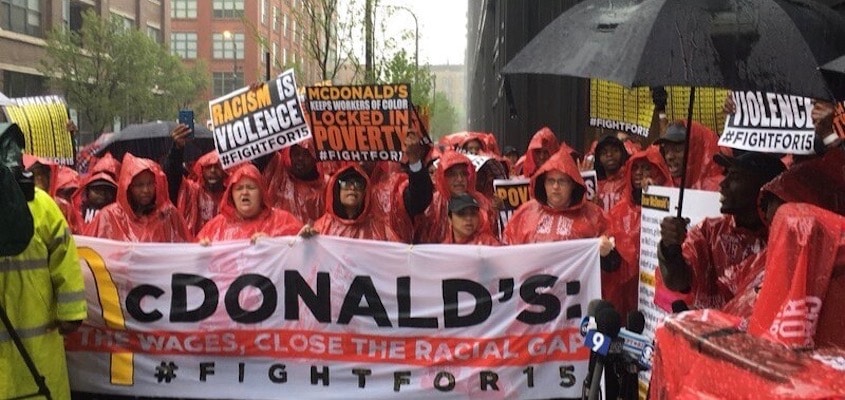Large proportions of African Americans registered strong opposition to building a wall on the southern border, keeping undocumented people in limbo, and mass deportations.
African Americans differ only slightly from Latino Americans in their attitudes towards immigration, and are in some ways more opposed than Hispanics to Donald Trump’s policies at the southern border. A comprehensive release of Gallup Polls conducted on immigration since 2006 confirms that the great ethnic political divide in the United States is between English-speaking, U.S.-born whites and virtually everybody else.
On most political issues, Hispanics — who can be of any race — line up somewhere in between Blacks and whites, with Blacks consistently taking the more “left” or “progressive” position. (U.S. ethnic alignments on political issues generally reflect objective, real-world social and economic data, with Hispanic unemployment, incarceration, income, wealth and health statistics placing them in between Blacks and whites.) Although the recent attention garnered by the Black anti-immigrant group ADOS may have raised questions about Black attitudes on the subject, the Gallup polls show remarkable agreement between Hispanics and African Americans on immigration questions.
Apparently, Gallup does not routinely tabulate responses by race/ethnicity – a growing problem among corporate pollsters, some of whom now group all “minorities” together while others release only “general” statistics, painting a distorted, too-white national portrait. In its in-depth immigration overview, Gallup compared general national responses from January of this year with white, Black and Hispanic answers to the same question back in June of 2016. Assuming that no earth-shaking changes have occurred in Black-Hispanic relations in the past three years, the polls reveal striking similarities in the two groups’ positions on immigration and citizenship.
Asked where they stand on “deporting all immigrants who are living in the United States illegally back to their home country,” Blacks and Hispanics spoke almost in unison. The polls showed 76 percent of Blacks were “opposed” (36 percent) or “strongly opposed” (40 percent) to the proposition, while 78 percent of Hispanics were “opposed” (46 percent) or “strongly opposed” (32 percent). Although 2 percent more Hispanics were generally opposed to immediately kicking out all undocumented people, significantly more Blacks (40 percent) than Hispanics (32 percent) took the “strongly opposed” position. Only 61 percent of whites were either “opposed” or “strongly opposed” to wholesale deportation of “illegals.”
On the question of “allowing immigrants living in the U.S. illegally the chance to become U.S. citizens if they meet certain requirements over a period of time,” the two ethnic groups were closely aligned. The poll showed 84 percent of Blacks either “favored” (36 percent) or “strongly favored” (48 percent) a road to citizenship, while 92 percent of Hispanics “favored” (50 percent) or “strongly favored” (42 percent) the idea. Again, Hispanics were generally somewhat more in favor, but a greater proportion of Blacks lined up in the “strongly favor” column. A total of 82 percent of whites “favored” (45 percent) or “strongly favored” (37 percent) a path to citizenship.
On “building a wall along the entire U.S.-Mexico border,” a subject that presidential candidate Donald Trump was loudly trumpeting in 2016, Blacks were equally as generally opposed to the concept, but significantly more fervent in their opposition than even Hispanics. For both groups, 82 percent were generally opposed to the wall. But 55 percent of Blacks were “strongly opposed” versus 40 percent of Hispanics. The order was reversed in the less vehement opposition column, with 27 percent of Blacks and 42 percent of Hispanics “opposed.”
The pattern is clear for all three questions. Black Americans closely agree with Hispanics on immigration issues, giving the “progressive” answer to Gallup’s inquiries as often, or almost as frequently, as Latinos. However, significantly larger proportions of Black respondents were adamant in their positions, “strongly” favoring or opposing the propositions presented to them.
There is no schism between Blacks and Hispanics over immigration, and we can conclude from the polling data that most Blacks do not blame immigrants, most of whom are Hispanic, for historically high Black unemployment rates, or for depressed wage levels. If Blacks blamed immigrants for these conditions, it would show up in the numbers. Instead, large proportions of African Americans registered what might be interpreted as militant opposition (“strongly”) to building a wall on the southern border, keeping undocumented people in limbo, and mass deportations. African Americans appear to feel more “strongly” about such things than Hispanics, although the Gallup poll shows that 85 percent of Black respondents and their parents were born in the U.S., versus only 32 percent of Hispanics. (The figure for whites is 88 percent.)
What Gallup tracked, unwittingly, were the statistical footprints of the progressive and enduring Black political consensus – deeply informed by the Black Radical Tradition. Black people take progressive positions on immigration despite the fact that wholesale immigration of low wage and undocumented workers does depress wages and degrade working conditions. That’s what the rulers intend it to do, and the effects are intimately experienced by workers at the bottom of the barrel, where Blacks have been stuck since they arrived on these shores. For most of Black American history, we were the workers that were blamed for every crime against labor committed by the owners of capital and industry and their political servants. The same white workers that blame immigrants for the precarity inflicted on today’s society by the bosses, once similarly scapegoated Black people. It is to African Americans’ credit that the vast bulk of us reject such chauvinism.

